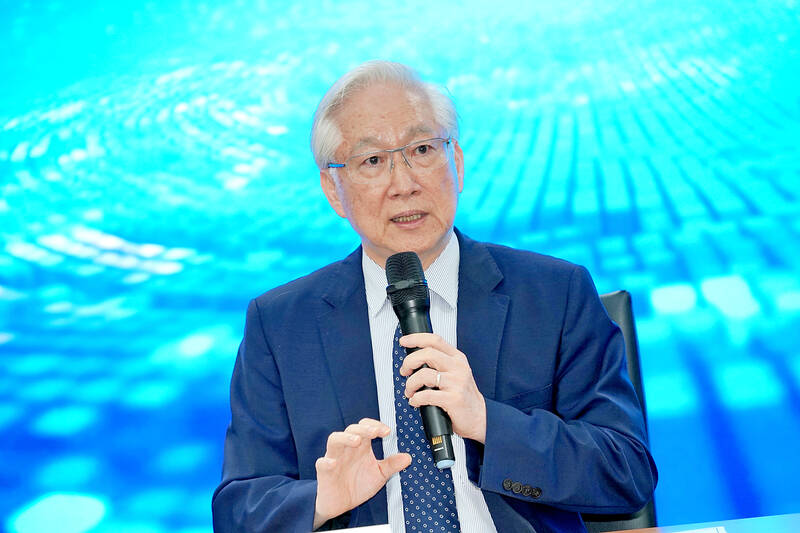Taiwan is to set up overseas training bases under a 10-year semiconductor innovation program initiated by the National Science and Technology Council (NSTC) as part of its efforts to enhance cooperation with other countries on chip development, NSTC Minister Wu Tsung-tsong (吳政忠) said on Wednesday.
Speaking with reporters after the council approved the 10-year development program earlier in the day, Wu said that Taiwan wants to play an important role in the global semiconductor industry with international cooperation expected to facilitate the manufacture of chips used in emerging technologies such as generative artificial intelligence (AI) applications.
Last month, the NSTC unveiled a 10-year chip program, which would be launched next year with an initial budget of NT$12 billion (US$373.7 million) in the first year, but the council did not provide financial details for all of the 10-year period. The program has a goal of making Taiwan a pivotal global IC design hub.

Photo: CNA
The program would assign entry-level IC technologies to its overseas training hubs, while training in more advanced IC processes would remain in Taiwan, Wu said.
The Taiwan Semiconductor Research Institute, run by the NSTC’s National Applied Research Laboratories, has already comprehensive IC development experience in training, IC design and IC manufacturing, and would back the overseas training bases, he added.
IC manufacturing is a capital-intensive industry, so only large economies can afford to have Taiwan Semiconductor Manufacturing Co (TSMC), the world’s largest contract chipmaker, set up production bases with an investment of US$10 billion or higher, Wu said.
On the other hand, as IC design development costs less than IC manufacturing, smaller-sized economies would have an opportunity to work with Taiwan in the field, Wu said.
The future overseas training bases, where Taiwanese lecturers would be assigned, are expected to help interested foreign countries become more acquainted with Taiwan’s IC design training system and forge closer tech cooperation, Wu said.
The 10-year program aims to encourage IC companies and research institutions to apply generative AI technologies to industrial development, while transforming Taiwan into a hub with a top IC talent pool, Wu said.
Although the program would support advanced IC process development, it would also aim to attract start-ups and investment institutions to come to Taiwan for cooperation, he said.
The 10-year program’s first five-year phase would focus on creating semiconductor centers, developing talent and establishing related infrastructure at the Industrial Technology Research Institute, the NSTC said.
In the long term, the program aims to help Taiwan achieve an IC design global market share of about 40 percent by 2033, and an 80 percent global market share for advanced semiconductors of 7 nanometers or below, it said.

Alain Robert, known as the "French Spider-Man," praised Alex Honnold as exceptionally well-prepared after the US climber completed a free solo ascent of Taipei 101 yesterday. Robert said Honnold's ascent of the 508m-tall skyscraper in just more than one-and-a-half hours without using safety ropes or equipment was a remarkable achievement. "This is my life," he said in an interview conducted in French, adding that he liked the feeling of being "on the edge of danger." The 63-year-old Frenchman climbed Taipei 101 using ropes in December 2004, taking about four hours to reach the top. On a one-to-10 scale of difficulty, Robert said Taipei 101

Nipah virus infection is to be officially listed as a category 5 notifiable infectious disease in Taiwan in March, while clinical treatment guidelines are being formulated, the Centers for Disease Control (CDC) said yesterday. With Nipah infections being reported in other countries and considering its relatively high fatality rate, the centers on Jan. 16 announced that it would be listed as a notifiable infectious disease to bolster the nation’s systematic early warning system and increase public awareness, the CDC said. Bangladesh reported four fatal cases last year in separate districts, with three linked to raw date palm sap consumption, CDC Epidemic Intelligence

Taiwanese and US defense groups are collaborating to introduce deployable, semi-autonomous manufacturing systems for drones and components in a boost to the nation’s supply chain resilience. Taiwan’s G-Tech Optroelectronics Corp subsidiary GTOC and the US’ Aerkomm Inc on Friday announced an agreement with fellow US-based Firestorm Lab to adopt the latter’s xCell, a technology featuring 3D printers fitted in 6.1m container units. The systems enable aerial platforms and parts to be produced in high volumes from dispersed nodes capable of rapid redeployment, to minimize the risk of enemy strikes and to meet field requirements, they said. Firestorm chief technology officer Ian Muceus said

MORE FALL: An investigation into one of Xi’s key cronies, part of a broader ‘anti-corruption’ drive, indicates that he might have a deep distrust in the military, an expert said China’s latest military purge underscores systemic risks in its shift from collective leadership to sole rule under Chinese President Xi Jinping (習近平), and could disrupt its chain of command and military capabilities, a national security official said yesterday. If decisionmaking within the Chinese Communist Party has become “irrational” under one-man rule, the Taiwan Strait and the regional situation must be approached with extreme caution, given unforeseen risks, they added. The anonymous official made the remarks as China’s Central Military Commission Vice Chairman Zhang Youxia (張又俠) and Joint Staff Department Chief of Staff Liu Zhenli (劉振立) were reportedly being investigated for suspected “serious